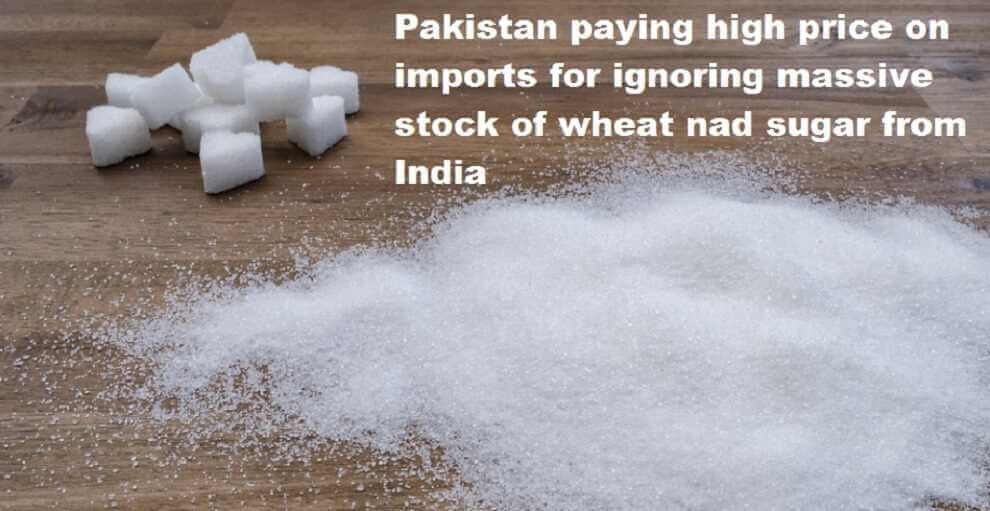While India exports excess sugar and wheat to nations in the Indian Ocean region, Pakistan, its neighbor, spends vast sums to import them from other regions of the world.
The Pakistan Cabinet’s Economic Coordination Committee (ECC) authorized the import of 1.1 lakh tonnes (lt) of wheat at $355.9 (26,000) per tonne and two lakh tonnes of granulated sugar at $657 (48,000) per tonne a fortnight ago. The Imran Khan government will spend $270 million (1.970 crores) to import these commodities in order to meet domestic demand and develop strategic reserves.
Pakistan decided earlier 2021 to import 6 lakh tonnes of white sugar, of which 1 lakh tonnes have already reached. The neighboring country has also decided to import 5 lakh tonnes of wheat, with one lakh tonnes already finalized through a tender at $304 (22,200) per tonne.
Also Read: Govt to purchase 2Lt onions as excess inventory to meet future demand
Import management loans
The ECC has asked the Trading Corporation of Pakistan, which is channeling the imports, to obtain commercial loans to manage the imports. Despite estimates of a record 27.3 million tonnes of wheat production this year, Pakistan is importing wheat.
Pakistan received the first shipment of one lakh tonne of sugar at a price of $515.97 (37,650) per tonne. Sugar prices in the international market are near a four-and-a-half-year high due to concerns about lower production in Brazil. On the Intercontinental Exchange, raw sugar prices have exceeded $20 cents per pound (32,400 per tonne) (ICE). For December delivery, white sugar is quoted at $505.90 (36,925) per tonne in London.
The Kashmir problem
These imports, however, will need to be approved by the Federal Cabinet. Pakistan is purchasing both commodities at significantly higher prices than India is offering to other countries. Islamabad is citing the Kashmir dispute as a reason for not importing any goods from India.
‘Kashmir, like any other issue, is merely a show of force. All of these transactions are shady,’ a trader source who did not want to be identified said. The ECC of the Pakistan Cabinet is looking into these transactions, especially since tenders that were finalized earlier this year were not honored.
While Pakistan is paying a high price for sugar and wheat imports, India is exporting both of these commodities at a very competitive price.
Cross-border delivery
‘Pakistan could have purchased sugar from India for $525-30 (38,300-38,675) per tonne. We could have delivered them by truck across our borders,’ said Rahil Shaikh, Managing Director of MEIR Commodities India. ‘Pakistan could be getting its sugar from one of Dubai’s refineries,’ he speculated.
Simultaneously, Indian sugar exporters have sold over 10 lt of sugar through forwarding contracts for the coming season, which begins in October. ‘The majority of the contracts are for the shipment of raw sugar. These will be bound for familiar destinations such as Indonesia,’ according to Shaikh.
According to All-India Sugar Traders Association Chairman, the majority of the export deals have been struck at $471.50 (34,400) per tonne free-on-rails from Kandla in Gujrat.
Also Read: Pakistan emerging serious competitor to India in world Maize market
Wheat costs
In the world wheat market, India is currently selling free-on-board at $290 (21,175) per tonne. It began exporting at $260 ($19,000) per tonne before raising the rates in response to a rise in global market prices. Wheat on the Chicago Board of Trade for December delivery is currently quoted at $6.96 per bushel (18,675 per tonne).
As per trade sources, Pakistan is the only country not utilizing India’s “mountain of stocks” of these commodities. Bangladesh has proven to be a major beneficiary of India’s massive stocks of wheat and rice. Likewise, Nepal and Sri Lanka import a significant amount of these from India.
According to data from the APEDA, Bangladesh imported 3.95 lt of wheat worth Rs.767.07 crore from April to June of this fiscal year. It spent Rs. 2,191 crore on 11.57 lt last fiscal.
During the Q1, Nepal imported 91,465 tonnes of wheat and Sri Lanka imported 76,280 tonnes for a total value of 322.48 crores. Last fiscal year, the Himalayan kingdom imported 3.28 lt and Lanka imported 94,041 tonnes for a total of Rs.798.07 crore.
An exporter said at least 150 trucks plied from India to Bangladesh daily to deliver maize (corn) consignments, echoing Shaikh’s views on sugar delivery. Prior to the demise of India-Pakistan relations, the majority of trade was conducted across the border via trucks.
Also Read: Pakistan may allow imports of cotton from India to re-establish bilateral trade
In April, the nod was rejected
Earlier this year, a similar situation arose with cotton and cotton yarn. In April, Pakistan’s Cabinet rejected an Economic Coordination Committee (ECC) approval to import sugar, cotton, and cotton yarn ‘until Article 370 is restored’ by India.
The ECC then approved the import of 5 lt of sugar by June 30 and cotton and cotton yarn beginning in June. Despite the fact that trade relations between India and Pakistan have been strained as a result of the Pulawama blast in February 2019, which killed 39 Central Reserve Police Force (CRPF) personnel, New Delhi has stated that it has no objections to India supplying sugar and cotton to Pakistan.
In May of last year, Pakistan allowed the import of Indian medicines to combat the Covid pandemic. It does not, however, want to import these essential commodities, the prices of which have skyrocketed in its domestic market.
India presently has ample supplies of wheat, sugar, and cotton. FCI had 56.48 mt of wheat stocks as of August 1, up from 51.32 mt the previous year. Food Corporation of India (FCI) stocks are up after the Centre purchased a record 43.32 million tonnes of wheat from farmers this year, up from 38.99 million tonnes last year. Furthermore, India produced a record 122.27 million tonnes of wheat this year. Sugar ending stocks in India are expected to be 8.7 million tonnes, while cotton ending stocks are expected to be more than 90 lakh bales (of 170 kg).


















Add Comment